
9
1. Unplug the refrigerator or disconnect power.
2. Turn OFF the main water supply. Turn on the nearest faucet to relieve the
pressure on the line. It may help to open an outside faucet to allow the water to
drain from the line in the house.
3. Find a
1
/
2
-inch vertical COLD water pipe near the refrigerator.
Connect
the tubing to
water line
•
Horizontal pipe will work, but the following precaution must be taken: Drill on the top of
the pipe, not the bottom. This will help keep water away from the drill. This also keeps
normal sediment from collecting in the valve.
NOTE
4. To determine the length of copper tubing you will need, measure from the
connection on the lower left rear of the refrigerator to the water pipe. Add 7
feet (2.1m) to allow for moving refrigerator for cleaning. Use
1
/
4
-inch O.D.
(outside diameter) copper tubing. Be sure both ends of copper tubing are cut
square.
5. Using a drill, drill a
1
/
4
-inch hole in the cold water pipe you have selected.
6. Fasten shut-off valve to cold water pipe with pipe clamp. Be sure the outlet
end is solidly in the
1
/
4
" drilled hole in the water pipe and the washer is under
the pipe clamp. Tighten the packing nut. Tighten the pipe clamp screws
carefully and evenly so the washer makes a watertight seal. Do not
overtighten or you may crush the copper tubing, especially if soft (coiled)
copper tubing is used. Now you are ready to connect the copper tubing.
7. Slip the compression sleeve and the compression nut onto the copper tubing
as shown. Insert the end of the tubing into the outlet end squarely as far as it
will go. Tighten the compression nut onto the outlet end with a wrench. A flare
nut wrench works best, but an open end wrench will suffice. Do not
overtighten.
8. Place the free end of the tubing into a container or sink, and turn on the main
water supply. Flush out the tubing until the water is clear. Turn off the shutoff
valve on the water pipe. Coil the copper tubing as shown below.
Installation


















